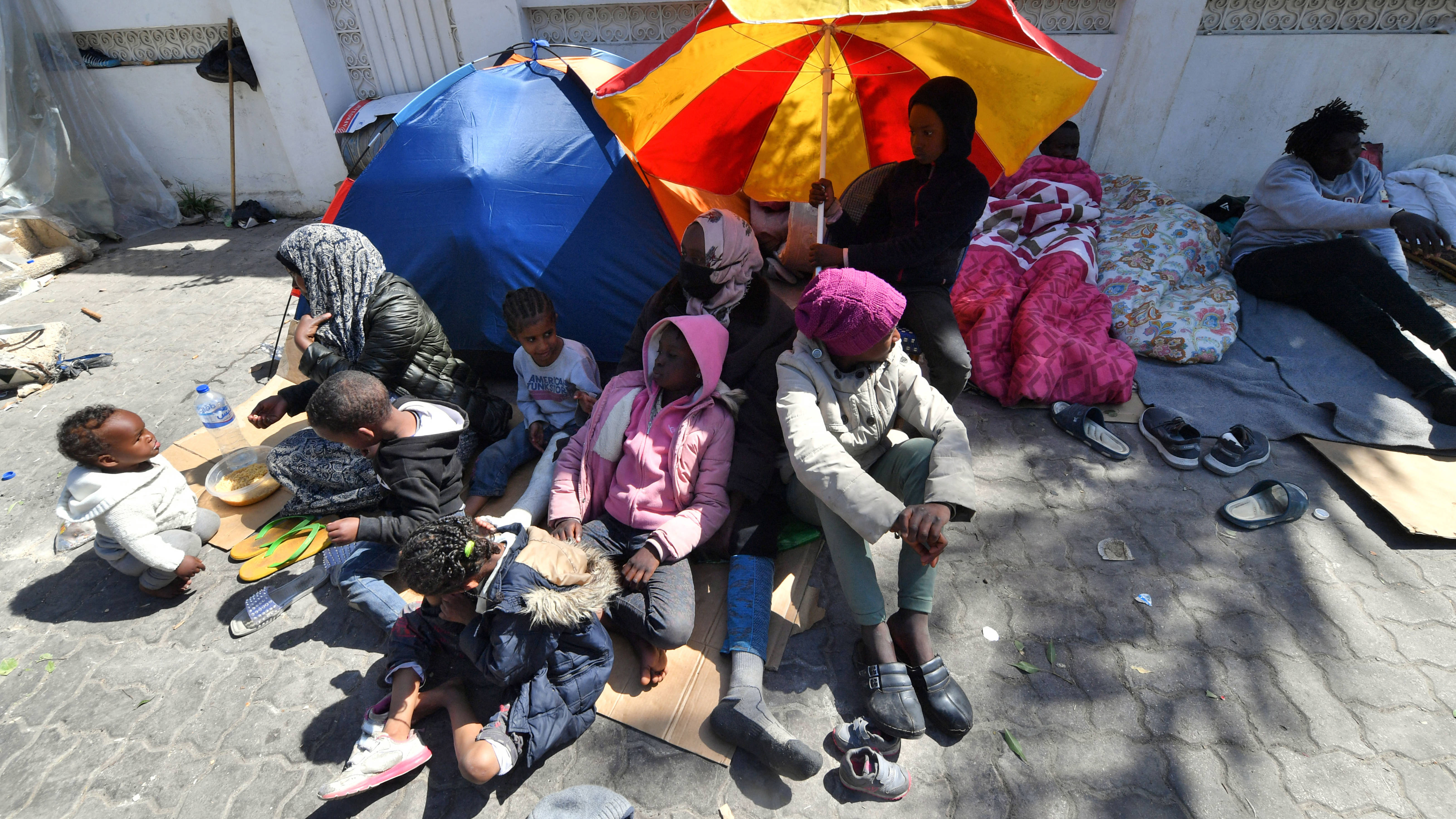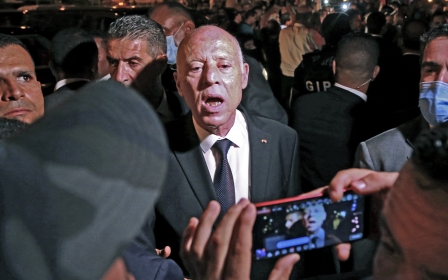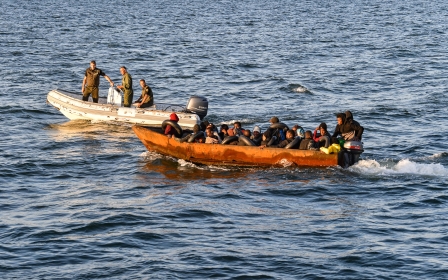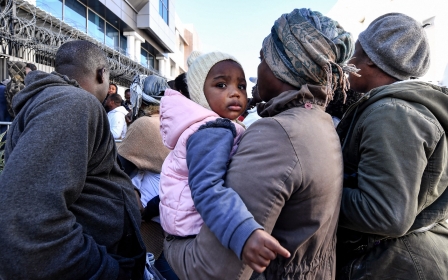Tunisia: Black refugees left reeling after violent police crackdown
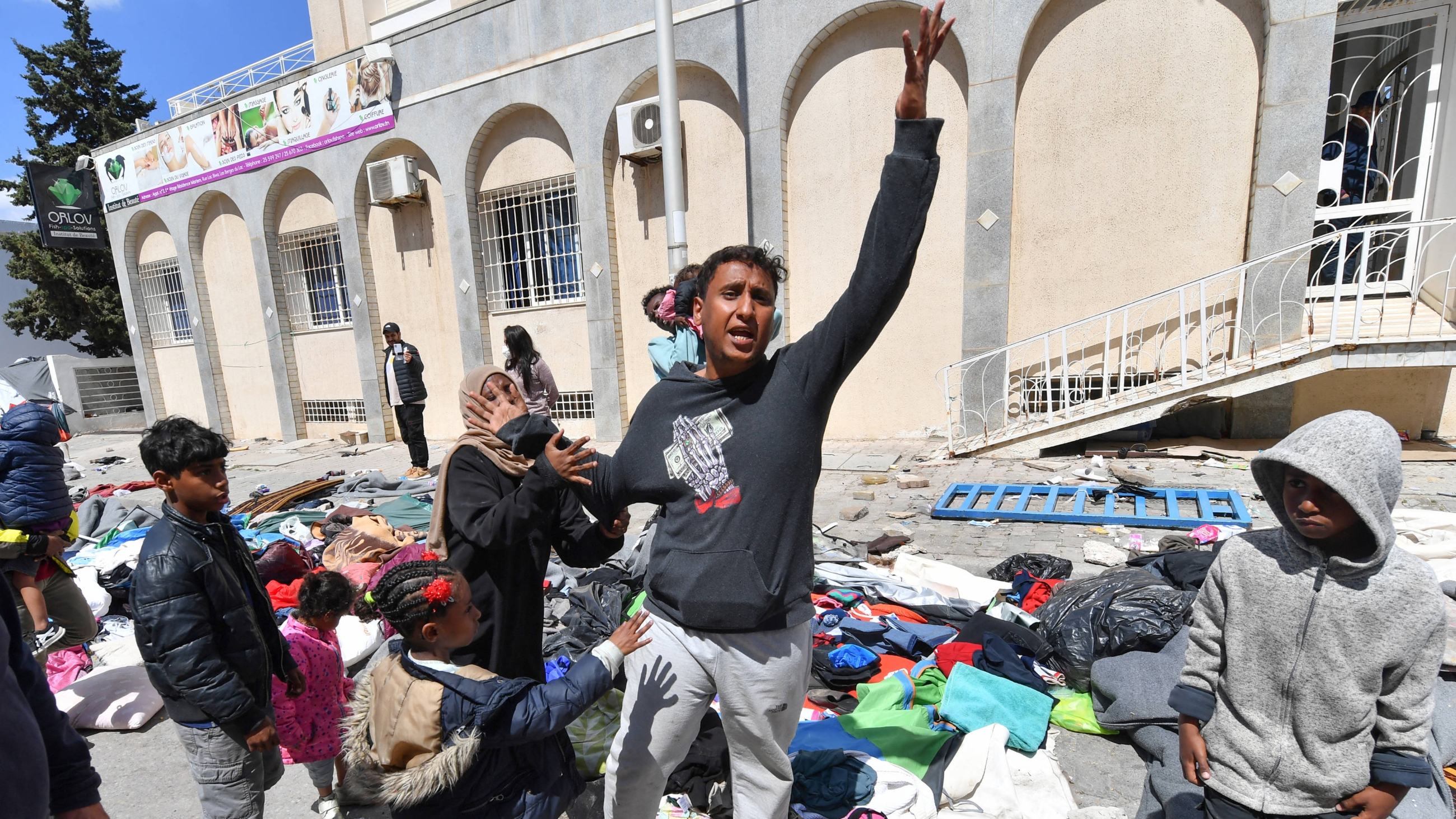
In a narrow alleyway next to the International Migration Organisation (IMO) in Tunis, there’s a makeshift camp with a couple of mattresses.
It currently shelters around 50 people, mostly refugees and asylum seekers from sub-Saharan African countries. There are no tents to protect them from the elements, or pots and pans for cooking. Food and water are in desperately short supply.
Many of these refugees had previously taken part in a month-long sit-in in front of the UNHCR, the UN Refugee Agency, demanding humanitarian evacuation from Tunisia. However earlier this week they were forced out of the area by the police, who destroyed the few personal items that they possessed.
For months Black refugees in Tunisia have been fearing for their safety, following President Kais Saied’s provocative statement in February when he linked people from sub-Saharan Africa in the country to criminality.
The president’s claim has led to a rise in attacks and evictions of refugees across the country, forcing them to flee with little more than the clothes on their backs.
New MEE newsletter: Jerusalem Dispatch
Sign up to get the latest insights and analysis on Israel-Palestine, alongside Turkey Unpacked and other MEE newsletters
The latest police crackdown emphasises the refugees’ lack of human rights in Tunisia, and pushes them to choose between life and death, one refugee said.
“They don’t want us to stay, and yet we can’t leave. Where are we supposed to go?”
“We fled wars in our countries to come here… To me, the only solution now is the sea, whether I live or die,” Ahmed* told Middle East Eye.
Confrontation with police
On 10 April, police began cracking down on the refugee protest in front of the UNHCR and attacked participants with teargas and batons, eyewitnesses said.
“We ran away and did not respond [to their actions],” said Emanuel, an asylum seeker who was at the sit-in.
Videos posted on social media purportedly showed protesters running away from the police and pouring milk on themselves to ease the burning pain.
'They did not care that there were children, pregnant women and sick people among us. They teargassed everyone'
- Natasha, asylum seeker
“The next morning, the police came more prepared. They clearly had orders,” said Mark, a 30-year-old from Nigeria.
That morning, a policeman allegedly slapped a Sudanese woman which escalated the confrontation. The police responded by throwing teargas all around the protest location.
“They did not care that there were children, pregnant women, and sick people among us. They teargassed everyone,” said Natasha, an asylum seeker from Sierra Leone. “When I finally stopped running, I threw up all that was in my stomach.”
“They hit us with batons, with electrified batons, we still have marks all over our bodies. We only responded with throwing stones to defend ourselves,” said Emanuel.
There were reports that the windows of several cars were destroyed in the area surrounding the UNHCR.
Mark said he suffered injuries to one eye as well as hearing damage due to the police violence.
“I don't even know how I survived, how I am alive talking to you right now. It was a complete warzone,” he told MEE. “We only threw rocks out of fear. We didn’t intentionally destroy property.”
‘Respect for the UN’
However, the government and UNHCR presented a different version of the narrative.
According to the spokesman for the Interior Ministry, the police were acting on behalf of the UNHCR, who requested help to disperse the refugee sit-in.
In a statement issued on April 11, the UNHCR claimed that “some refugees, asylum seekers, and migrants forcibly entered its premises, causing some material damage, and leading to tense interactions with local police forces.”
The UN refugee agency said that around 200 people began the sit-in outside UNHCR offices three weeks ago requesting a way out of the country and humanitarian evacuation. But the situation intensified on March 30 when some protesters blocked access to its main entrance and prevented other refugees from accessing the services they needed inside the premises.
“While UNHCR understands the fears and frustrations of those protesting and respects their right to peacefully protest in line with national laws, we denounce the recent incidents at our premises by a small group of protestors and urge all to engage with us in the search for meaningful and peaceful solutions, as repeatedly proposed since the start of the demonstration, and let other people in need access our premises and services,” said Monica Noro, UNHCR representative in Tunis.
“We ask for the humanitarian nature of our work to be respected,” the statement said.
MEE has contracted both UNHCR and the IOM for this article, but neither has yet to respond.
Protesters did not deny attacking vehicles outside the UNHCR offices but insisted that it was mostly in self-defense in response to police violence.
“We have been peacefully protesting for almost a month now, did they stop to wonder why we only became violent now?” asked one asylum seeker.
An enormous feeling of frustration and injustice might have led some protesters to lose their tempers, according to several refugees at the makeshift camp in front of the IOM.
Following the police crackdown on their protest, local news outlets put out one-sided reports presenting Black migrants as violent and dangerous by focusing on the vehicles damaged in the confrontation.
Refugees were also enraged by UNHCR’s claim that they had been in direct communication with the protesters to listen to their concerns, as well as providing “information about the available options”.
They said they had not received any material aid from either the UNHCR or the IOM.
“It’s all lies. No one came to talk to us. One employee even told us that we would all die here. That’s all we have heard from the UNHCR. We went there because it’s their job to protect us. This is their responsibility,” Mark said.
Arrests and torture claims
Police arrested about 80 refugees and asylum seekers from the protest and brought them to the police station.
“I spent more than seven hours waiting. They saw that I was injured and did not provide any medical assistance,” Mark told MEE, adding that he had no access to food or water either.
Eyewitnesses said that while most of the refugees were released later that day, around 30 protesters - including some of the most outspoken ones - remained in custody.
No information has yet been provided as to what they will be charged with or what will happen to them.
'They treat us like animals'
- Asylum seeker
“My husband has been gone for more than a day. And I still don’t know where he is or what happened to him,” said a refugee who is three months pregnant.
Reports of torture and mistreatment of those arrested have also been emerging.
After the sit-in was dispersed, the protesters returned to the location to find that their belongings were no longer there.
They said the police had thrown away their tents, clothes, even money and phones, most of which came from donations made by civil society organisations.
“I can’t even change into clean clothes. They took all of our tents, we’re just sleeping in the open air, in the cold. We can’t even cook. How can they treat human beings like this? They have no humanity,” said Natasha.
“How could they not think that this is someone’s whole life that they’re throwing away? They treat us like animals,” exclaimed another asylum seeker.
Growing frustration
The sit-in in front of the UNHCR started in mid-march following Saied’s anti-migrant statement urging authorities to take "urgent measures" to tackle "irregular immigration".
Saied said Tunisia was threatened by Black immigrants from sub-Saharan Africa, who he claimed, without evidence, were leading a demographic change.
Some refugees said they felt an immediate shift in the country’s attitude towards them following Saied's comment, as attacks and evictions became commonplace against Black people living in Tunisia.
Ahmed said he was fired from his job just days after the president made the comment, and that “people’s behaviours completely changed”.
As for Emanuel, he was evicted despite having fulfilled his responsibility as a tenant.
“On March 21, after I paid my rent, my landlord came to tell me that he couldn’t house any Black people, by order of the President,” he told MEE.
Others shared accounts of racist incidents, some beaten by neighbours while others attacked with rocks in the UNHCR shelter in Raoued.
For years refugees and asylum seekers have been asking for better rights and protection in Tunisia, but following Saied’s speech, they feel their lives are now in danger and demand to be resettled in any other country that would respect their human rights.
“No job, no home, being treated like we are not even human, why would I want to stay here? We only have one life, we can’t waste it by waiting here,” Ahmed* said.
“There was always racism in Tunisia. But not this much violence. How can we keep living here when the people hate us?,” asked the manager of the Twitter account Refugees in Tunisia.
“It would take generations for this racism to change.”
According to Tunisian authorities, more than 14,000 people, most of them from sub-Saharan Africa, were intercepted or rescued in the first three months of this year while trying to cross to Europe, five times more than figures recorded in the same period last year.
The recent surge in crossings and deaths in the Mediterranean Sea off the coast of Tunisia comes amid a crackdown by the government on sub-Saharan African immigrants.
*Name change for anonymity
Middle East Eye delivers independent and unrivalled coverage and analysis of the Middle East, North Africa and beyond. To learn more about republishing this content and the associated fees, please fill out this form. More about MEE can be found here.


